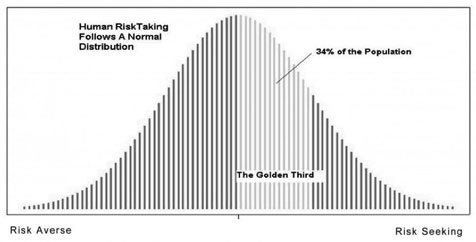Life
How Smart Risk Taking Can Impact Your Life & Happiness

According to the Oxford Dictionary the word ‘risk’ means, “A situation involving exposure to danger”. Realistically, this could range from something as simple as falling over when walking, to losing control of your bike, or even crashing your car; the list of possible dangers are endless.
Exploration in to the world of risk has shown that you can measure what kind of risk taker you are, much like an IQ score. A study with a large group of people will show that, on average, people are neither as low as a number one (averse to taking any risk as small as stepping out the front door) or are extreme dare devils (such as the famous Evel Knievel).
William Gurstelle, the Ballistics and Pyrotechnics Editor for Popular Mechanics Magazine has carried out years of research on risk aversion. It is his belief that a person’s inclination to risk-taking has a profound impact on their happiness and life satisfaction. This ties in closely to the endless asked question of whether we make our own luck in life.
Are people lucky or do they take the right risks at the right time? Science would tell us that lucky people take advantage of chance opportunities more than others; they are more likely to take risks. The more risks you take in life the more chance you have of doing something great.
Gurstelle’s research looked at the two extremes of risk-taking and found that the average person lies right in the middle. However, just to the right of the middle towards the Evel Knievel side of risk-taking lies what he calls the “Golden Third”. William Gurstelle argues: “People who fall into the Golden Third, who are more willing to take risks and capitalise on opportunities, experience the highest index of life satisfaction and fulfilment”.

How Risk Taking Can Impact Your Life & Happiness
THE GOLDEN THIRD
Once you enter the golden third, there is a fine balance in staying there. Advanced Riskology founder, Tyler Tervooren is committed to helping people utilise smart risk opportunities and live better lives through uncertainty. Tyler has granted us his time for an interview to share his insight and advice. The information provided should be able to guide you through the process of making good risks in everyday life.
Tervooren argues that: “Most people take risks because they don’t understand them”.
“We fear that which we don’t understand.”
When you take a risk, like applying for a new job, that doesn’t lead to the desired outcome and you don’t understand why you didn’t get it, especially if you have all of the relevant qualifications, you may be tempted to give up and stop trying again.
“Unless you understand how to take smart risks, this will be most people’s experience with it”. However, spend the time to research and understand what you are about to get yourself into, and then find a way to “dip your toe in”. Validate your big risk by taking smaller, less life altering ones first.
“Smart risk-taking can become a habit, just like anything else can. By repeating the steps necessary to take a smart risk – research, plan, test, evaluate etc. You can integrate that workflow into your habits so that it will always inform the risks you take”.
The fear factor to taking risk is likely to stay, as Tyler states: “as humans, we will stagnate unless we consciously push ourselves”.
Continuous discipline of the mind is essential to knowing how to take smart risks. As it is a fundamental part of the human experience, the more you practice and do it, the more it becomes natural: “Children learn to crawl before they walk. They walk before they run, and they run before they drive cars, fly aeroplanes, so on and so forth. At each step, there’s a fear barrier that has to be overcome”. With many sequences of successes before “you learn something and adjust for the next one which, of course, makes it that much scary to do”.
Advanced Riskology provides guidance on embracing the unknown without promoting any particular action. Tyler suggest that to live a fulfilled life we need to concentrate and improve on the risks that we are already skilled in and address the ones we struggle with, the ones that are holding us back from having the life we want.
He highlights:
“We tend not to notice that we’re good at something until we see others around us struggling with it”.
Even small moves in this area of your life will be uncomfortable, but if anything else Tyler assures that it simply means that “you’re headed in the right direction”.
Always remember there it is a fine art to stating balanced and living in the ‘Golden Third’ and straying into the reckless stage of many thrill seekers. A prime example of this in today’s world would be the guys from Jackass or Dirty Sanchez.
Jane Downshire, a qualified councillor for Teenage Translated, specialises in teenage development and emotional literacy. On a daily basis, she struggles with the challenge of educating the high risk-taking tendencies of teenagers.
Janey offers to share some advice on how to manage risk-taking effectively:
“People must reflect on their actions and assess the outcomes consciously. Without feedback on your actions you can become narcissistic and uncivilised. When the consequences of your actions bare no meaning to you, you can become destructive to the people around you”.
Furthermore, Lynsey Dixon, Head of Marketing at Tombola (an online bingo betting site), speaking on the subject of associated problems with The Golden Third and the ways in which individuals can seek help, said: “In the gaming industry it is important to remember that it is about enjoying the thrill of the game and not about gambling to make money. At tombola, we place huge emphasis on the overall experience. We take our responsibilities seriously and work with a number of organisations to offer support, help and guidance to those who need it and encourage sensible behaviour. It is crucial that individuals stay in control when taking risks, regardless of the situation”.
Conclusion
Know that risk-taking is an important part of development and it is essential to maintain a level of curiosity, motivation and desire to move forward. However, always maintain a conscious awareness of your actions through active reflection and you will learn to enjoy the process of smart-thinking.
Did You Know
How Skilled Migrants Are Building Successful Careers After Moving Countries
Behind every successful skilled migrant career is a mix of resilience, strategy, and navigating systems built for locals.

Moving to a new country for work is exciting, but it can also be unnerving. Skilled migrants leave behind familiar systems, networks, and support to pursue better job opportunities and a better future for their families. (more…)
Life
10 Research-Backed Steps to Create Real Change This New Year
This New Year could finally be the one where you break old patterns and create real, lasting change.

Every New Year, we make plans and set goals, but often repeat old patterns. (more…)
Life
9 Harsh Truths Every Young Man Must Face to Succeed in the Modern World
Before chasing success, every young man needs to face these 9 brutal realities shaping masculinity in the modern world.

Many young men today quietly battle depression, loneliness, and a sense of confusion about who they’re meant to be.
Some blame the lack of deep friendships or romantic relationships. Others feel lost in a digital world that often labels traditional masculinity as “toxic.”
But the truth is this: becoming a man in the modern age takes more than just surviving. It takes resilience, direction, and a willingness to grow even when no one’s watching.
Success doesn’t arrive by accident or luck. It’s built on discipline, sacrifice, and consistency.
Here are 9 harsh truths every young man should know if he wants to thrive, not just survive, in the digital age.
1. Never Use Your Illness as an Excuse
As Dr. Jordan B. Peterson often says, successful people don’t complain; they act.
Your illness, hardship, or struggle shouldn’t define your limits; it should define your motivation. Rest when you must, but always get back up and keep building your dreams. Motivation doesn’t appear magically. It comes after you take action.
Here are five key lessons I’ve learned from Dr. Peterson:
-
Learn to write clearly; clarity of thought makes you dangerous.
-
Read quality literature in your free time.
-
Nurture a strong relationship with your family.
-
Share your ideas publicly; your voice matters.
-
Become a “monster”, powerful, but disciplined enough to control it.
The best leaders and thinkers are grounded. They welcome criticism, adapt quickly, and keep moving forward no matter what.
2. You Can’t Please Everyone And That’s Okay
You don’t need a crowd of people to feel fulfilled. You need a few friends who genuinely accept you for who you are.
If your circle doesn’t bring out your best, it’s okay to walk away. Solitude can be a powerful teacher. It gives you space to understand what you truly want from life. Remember, successful men aren’t people-pleasers; they’re purpose-driven.
3. You Can Control the Process, Not the Outcome
Especially in creative work, writing, business, or content creation, you control effort, not results.
You might publish two articles a day, but you can’t dictate which one will go viral. Focus on mastery, not metrics. Many great writers toiled for years in obscurity before anyone noticed them. Rejection, criticism, and indifference are all part of the path.
The best creators focus on storytelling, not applause.
4. Rejection Is Never Personal
Rejection doesn’t mean you’re unworthy. It simply means your offer, idea, or timing didn’t align.
Every successful person has faced rejection repeatedly. What separates them is persistence and perspective. They see rejection as feedback, not failure. The faster you learn that truth, the faster you’ll grow.
5. Women Value Comfort and Security
Understanding women requires maturity and empathy.
Through books, lectures, and personal growth, I’ve learned that most women desire a man who is grounded, intelligent, confident, emotionally stable, and consistent. Some want humor, others intellect, but nearly all want to feel safe and supported.
Instead of chasing attention, work on self-improvement. Build competence and confidence, and the rest will follow naturally.
6. There’s No Such Thing as Failure, Only Lessons
A powerful lesson from Neuro-Linguistic Programming: failure only exists when you stop trying.
Every mistake brings data. Every setback builds wisdom. The most successful men aren’t fearless. They’ve simply learned to act despite fear.
Be proud of your scars. They’re proof you were brave enough to try.
7. Public Speaking Is an Art Form
Public speaking is one of the most valuable and underrated skills a man can master.
It’s not about perfection; it’s about connection. The best speakers tell stories, inspire confidence, and make people feel seen. They research deeply, speak honestly, and practice relentlessly.
If you can speak well, you can lead, sell, teach, and inspire. Start small, practice at work, in class, or even in front of a mirror, and watch your confidence skyrocket.
8. Teaching Is Leadership in Disguise
Great teachers are not just knowledgeable. They’re brave, compassionate, and disciplined.
Teaching forces you to articulate what you know, and in doing so, you master it at a deeper level. Whether you’re mentoring a peer, leading a team, or sharing insights online, teaching refines your purpose.
Lifelong learners become lifelong leaders.
9. Study Human Nature to Achieve Your Dreams
One of the toughest lessons to accept: most people are self-interested.
That’s not cynicism, it’s human nature. Understanding this helps you navigate relationships, business, and communication more effectively.
Everyone has a darker side, but successful people learn to channel theirs productively into discipline, creativity, and drive.
Psychology isn’t just theory; it’s a toolkit. Learn how people think, act, and decide, and you’ll know how to lead them, influence them, and even understand yourself better.
Final Thoughts
The digital age offers endless opportunities, but only to those who are willing to take responsibility, confront discomfort, and keep improving.
Becoming a man today means embracing the hard truths most avoid.
Because at the end of the day, success isn’t about luck. It’s about who you become when life tests you the most.
Change Your Mindset
The Four Types of Happiness: Which One Are You Living In?
Most people chase success only to find emptiness, this model reveals why true happiness lies somewhere else.

In a world driven by rapid technological growth and constant competition, many people unknowingly trade joy for achievement. (more…)
-

 Health & Fitness2 weeks ago
Health & Fitness2 weeks agoWhat Minimalism Actually Means for Your Wellness Choices
-

 News7 days ago
News7 days agoBrandon Willington Builds 7-Figure Business by Ignoring Almost Everything
-

 Did You Know1 week ago
Did You Know1 week agoWhy Most Online Courses Fail and How to Fix Them
-

 Business2 weeks ago
Business2 weeks agoIf Your Business Internet Keeps Letting You Down, Read This
-

 Business4 hours ago
Business4 hours agoEntrepreneur’s Guide to Pay Stubs: Why Freelancers and Small Business Owners Need a Smart Generator

























1 Comment